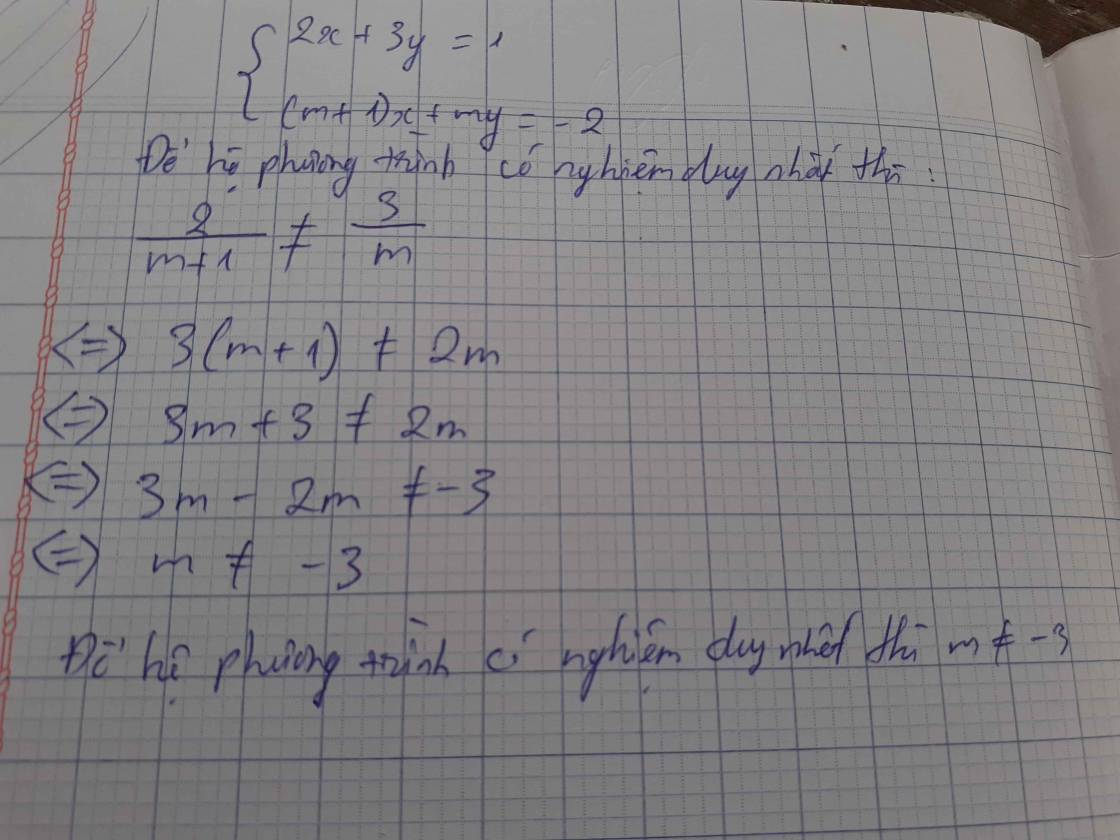Hãy nhập câu hỏi của bạn vào đây, nếu là tài khoản VIP, bạn sẽ được ưu tiên trả lời.

Lời giải:
a)
Với $a=1$ thì hệ trở thành:
\(\left\{\begin{matrix}
2x+y=-4\\
x-3y=5\end{matrix}\right.\Leftrightarrow \left\{\begin{matrix}
6x+3y=-12\\
x-3y=5\end{matrix}\right.\)
\(\Rightarrow 7x=-12+5=-7\Rightarrow x=-1\)
\(y=-4-2x=-4-(-2)=-2\)
Vậy HPT có nghiệm $(x,y)=(-1,-2)$
b)
Từ PT\((1)\Rightarrow x=\frac{-4-ay}{2}\)
Thay vào PT$(2)$: \(a.\frac{-4-ay}{2}-3y=5\)
\(\Leftrightarrow y(a^2+6)=-4a-10(*)\)
Để HPT ban đầu có nghiệm $(x,y)$ duy nhất thì PT $(*)$ phải có nghiệm $y$ duy nhất. Dễ thấy $a^2+6\neq 0$ với mọi $a\in\mathbb{R}$ nên PT $(*)$ luôn có nghiệm duy nhất với mọi $a$
Vậy $a\in\mathbb{R}$
Lời giải:
a)
Với $a=1$ thì hệ trở thành:
\(\left\{\begin{matrix}
2x+y=-4\\
x-3y=5\end{matrix}\right.\Leftrightarrow \left\{\begin{matrix}
6x+3y=-12\\
x-3y=5\end{matrix}\right.\)
\(\Rightarrow 7x=-12+5=-7\Rightarrow x=-1\)
\(y=-4-2x=-4-(-2)=-2\)
Vậy HPT có nghiệm $(x,y)=(-1,-2)$
b)
Từ PT\((1)\Rightarrow x=\frac{-4-ay}{2}\)
Thay vào PT$(2)$: \(a.\frac{-4-ay}{2}-3y=5\)
\(\Leftrightarrow y(a^2+6)=-4a-10(*)\)
Để HPT ban đầu có nghiệm $(x,y)$ duy nhất thì PT $(*)$ phải có nghiệm $y$ duy nhất. Dễ thấy $a^2+6\neq 0$ với mọi $a\in\mathbb{R}$ nên PT $(*)$ luôn có nghiệm duy nhất với mọi $a$
Vậy $a\in\mathbb{R}$

`a,x-3y=2`
`<=>x=3y+2` ta thế vào phương trình trên:
`2(3y+2)+my=-5`
`<=>6y+4+my=-5`
`<=>y(m+6)=-9`
HPT có nghiệm duy nhất:
`<=>m+6 ne 0<=>m ne -6`
HPT vô số nghiệm
`<=>m+6=0,-6=0` vô lý `=>x in {cancel0}`
HPT vô nghiệm
`<=>m+6=0,-6 ne 0<=>m ne -6`
b,HPT có nghiệm duy nhất
`<=>m ne -6`(câu a)
`=>y=-9/(m+6)`
`<=>x=3y+2`
`<=>x=(-27+2m+12)/(m+6)`
`<=>x=(-15+2m)/(m+6)`
`x+2y=1`
`<=>(2m-15)/(m+6)+(-18)/(m+6)=1`
`<=>(2m-33)/(m+6)=1`
`2m-33=m+6`
`<=>m=39(TM)`
Vậy `m=39` thì HPT có nghiệm duy nhất `x+2y=1`
b)Ta có: \(\left\{{}\begin{matrix}2x+my=-5\\x-3y=2\end{matrix}\right.\)
\(\Leftrightarrow\left\{{}\begin{matrix}x=2+3y\\2\left(2+3y\right)+my=-5\end{matrix}\right.\Leftrightarrow\left\{{}\begin{matrix}x=2+3y\\6y+my+4=-5\end{matrix}\right.\)
\(\Leftrightarrow\left\{{}\begin{matrix}x=3y+2\\y\left(m+6\right)=-9\end{matrix}\right.\)
Khi \(m\ne6\) thì \(y=-\dfrac{9}{m+6}\)
\(\Leftrightarrow\left\{{}\begin{matrix}x=3y+2\\y=\dfrac{-9}{m+6}\end{matrix}\right.\Leftrightarrow\left\{{}\begin{matrix}x=3\cdot\dfrac{-9}{m+6}+2\\y=-\dfrac{9}{m+6}\end{matrix}\right.\)
\(\Leftrightarrow\left\{{}\begin{matrix}x=\dfrac{-27}{m+6}+\dfrac{2m+12}{m+6}=\dfrac{2m-15}{m+6}\\y=\dfrac{-9}{m+6}\end{matrix}\right.\)
Để hệ phương trình có nghiệm duy nhất thỏa mãn x+2y=1 thì \(\dfrac{2m-15}{m+6}+\dfrac{-18}{m+6}=1\)
\(\Leftrightarrow2m-33=m+6\)
\(\Leftrightarrow2m-m=6+33\)
hay m=39
Vậy: Khi m=39 thì hệ phương trình có nghiệm duy nhất thỏa mãn x+2y=1

Để pt có nghiệm duy nhất \(\Leftrightarrow-6-a^2\ne0\Rightarrow a^2\ne-6\) (luôn đúng)
Vậy hệ luôn có nghiệm duy nhất
\(\left\{{}\begin{matrix}6x+3ay=-12\\a^2x-3ay=5a\end{matrix}\right.\) \(\Rightarrow\left(a^2+6\right)x=5a-12\) \(\Rightarrow\left\{{}\begin{matrix}x=\frac{5a-12}{a^2+6}\\y=\frac{-4a-10}{a^2+6}\end{matrix}\right.\)
\(x+y>1\Leftrightarrow\frac{5a-12}{a^2+6}+\frac{-4a-10}{a^2+6}>1\Leftrightarrow a-22>a^2+6\)
\(\Leftrightarrow a^2-a+28< 0\Leftrightarrow\left(a-\frac{1}{2}\right)^2+\frac{111}{4}< 0\) (vô lý)
Vậy ko tồn tại a thỏa mãn

a: Khi m=căn 2 thì hệ sẽ là:
2x-y=căn 2+1 và x+y*căn 2=2
=>\(\left\{{}\begin{matrix}2x-y=\sqrt{2}+1\\2x+2y\sqrt{2}=4\end{matrix}\right.\Leftrightarrow\left\{{}\begin{matrix}-y-2y\sqrt{2}=\sqrt{2}-3\\2x-y=\sqrt{2}+1\end{matrix}\right.\)
=>\(\left\{{}\begin{matrix}y=-1+\sqrt{2}\\2x=\sqrt{2}+1+\sqrt{2}-1=2\sqrt{2}\end{matrix}\right.\Leftrightarrow\left\{{}\begin{matrix}x=\sqrt{2}\\y=\sqrt{2}-1\end{matrix}\right.\)
b: Để hệ có nghiệm thì 2/1<>-1/m
=>-1/m<>2
=>m<>-1/2

Từ pt (1) ta có: y=ax-2 thế vào pt (2) ta được:
\(x+a\left(ax-2\right)=3\)
\(\Leftrightarrow x+a^2x-2a=3\)
\(\Leftrightarrow\left(a^2+1\right)x=2a+3\)
\(\Leftrightarrow x=\dfrac{2a+3}{a^2+1}\) (Vì \(a^2+1\ne0\))
\(\Rightarrow y=a\cdot\dfrac{2a+3}{a^2+1}-2=\dfrac{3a-2}{a^2+1}\)
Vậy với mọi a hệ có nghiệm duy nhất là \(\left(x;y\right)=\left(\dfrac{2a+3}{a^2+1};\dfrac{3a-2}{a^2+1}\right)\)

a: Khi a=1 thì hệ sẽ là:
2x+y=-4 và x+3y=5
=>x=-17/5; y=14/5
b: Để hệ có nghiệm duy nhất thì 2/a<>a/3
=>a^2<>6
=>\(a\ne\pm\sqrt{6}\)